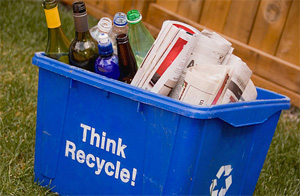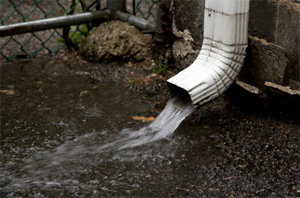
Recycling/Waste
- Donate to charities that accept unneeded items that cannot be recycled.
- Use refill kits for ink cartridges and toner cartridges.
- Recycle ink cartridges and toner cartridges that cannot be refilled
- Use labeled recycling bins for aluminum, glass, plastic, metal and cardboard.
- Identify and use recycling locations.
- Purchase recycled paper and office products.

Food
- Support your local farmers’ markets.
- Purchase fair trade coffee and tea (that is sustainably grown) through the Presbyterian Coffee Project.
- Prepare vegetarian recipes.
- Be a pick-up location for CSA (Community Supported Agriculture)
- Make your own less-toxic cleaning supplies with vinegar, baking soda, salt, borax, etc.
Grounds
- Practice green landscaping (greenscaping or xeriscaping)
- Eliminate pesticides with organic gardening.
- Use integrated pest management (IPM) methods
- Practice green landscaping (greenscaping or xeriscaping)
- Select plants for church grounds that are native to the area to decrease invasive species and reduce the need for watering.
- Consider diverting gray water for irrigation rather than using fresh water.
- Use a rain barrel or cistern to store rainwater for later use.
- Compost yard waste and food scraps.
- Increase wildlife habitat on church grounds by planting butterfly gardens, pollinator gardens, or creating other habitat.
- Become certified as a “Community Wildlife Habitat” from the National Wildlife Federation.
- Plant shade trees to reduce heat gain and help with storm water management.

Energy use, conservation and renewable energy possibilities
- Perform a professional energy audit: Though not required, Earth Care Teams are encouraged to complete a professional energy audit of church buildings in addition to the ECC Environmental Audit. An energy audit critiques the energy efficiency of your buildings and recommends steps to make your buildings more energy efficient. An energy audit will give you much of the information you need to complete the energy conservation section of the ECC Environmental Audit and help you set goals for the future.
- Contact your utility company to see if they offer free or low-cost energy audits for churches
- Contact your local or state government to learn about incentive programs for energy audits
- ENERGY STAR for Congregations: Environmental Protection Agency program to assist churches with energy efficiency. Participating churches receive technical help and may use the Portfolio Manager system to track and reduce energy.
- Explore LEED (Leadership in Energy & Environmental Design) Certification.
- PC(USA) Carbon neutral challenge
- Interfaith Power and Light congregation carbon calculator
- Find incentives for renewable power and energy efficiency.
- Purchase ENERGY STAR appliances
- Learn about options for buying green power.
- Perform two preseason checkups to maintain HVAC systems each year.
Suggestions for heating and cooling energy conservation
- Determine how well insulated different parts of your church are, and add insulation where necessary and effective.
- Install an insulation blanket on water heaters seven years of age or older, and insulate the first three feet of the heated water “out” pipe from your water heater.
- Install an energy-efficient electric or gas water heater.
- In areas of infrequent water use, consider “tankless” water heaters to reduce “standby” storage costs and waste.
- Set your water heater to 110–120 degrees Fahrenheit where appropriate (some local health codes require higher temperatures).
- Install seven-day programmable thermostats.
- Install thermal shades for windows to conserve heat in winter.
- Install tinted windows to reduce solar heat gain in summer.
- Clean or change your HVAC filter once a month.
- Utilize natural light where possible.
- Utilize natural cooling and ceiling fans to avoid use of air conditioning.
- Check ductwork to ensure that joints are sealed.
- Include responsibility for best environmental practices in your church’s facilities manager’s job description or include this in the duties of the building and grounds committee.
- Establish a fund for energy improvements in the church’s budget.
Water conservation
- Repair leaking pipes, fixtures and seals and consider purchasing low-flow toilets and waterless urinals.
- Install controls that turn faucets off automatically, and/or put reminder signs near faucets to not let water run unnecessarily.
- ENERGY STAR for Congregations
- Environmental Protection Agency WaterSense
Storm Water Management

- Plant a rain garden or install a bioswale (landscape elements designed to concentrate or remove debris and pollution out of surface runoff water).
- Create a green roof on your church.
- When repaving the church’s parking lot, consider a permeable paver.
Recognition and programs available for greening facilities
- Earth Ministry Greening Congregations Program
- ENERGY STAR Certification for Houses of Worship that demonstrate superior energy efficiency through the free Portfolio Manager Tool
- Interfaith Power and Light: many state chapters offer Congregational Covenants.
General resources and suggestions for facilities
- Web of Creation’s “The Environmental Guide for Congregations, Their Buildings, and Grounds”
- Explore green design and remodeling options if your church is rebuilding or renovating.
- Purchase used items for renovations.
- Learn about Indoor Air Quality.
- Recycle or donate used items if your church does renovations.
Earth care success stories from other congregations
- Church Earth Care Stories on PHP’s Eco-Journey Blog
- National Religious Partnership for the Environment
- Interfaith Power and Light
The preceding tips and resources were derived from PC(USA)’s
Earth Care Congregations
2018 Guide to Greening Presbyterian Churches.

